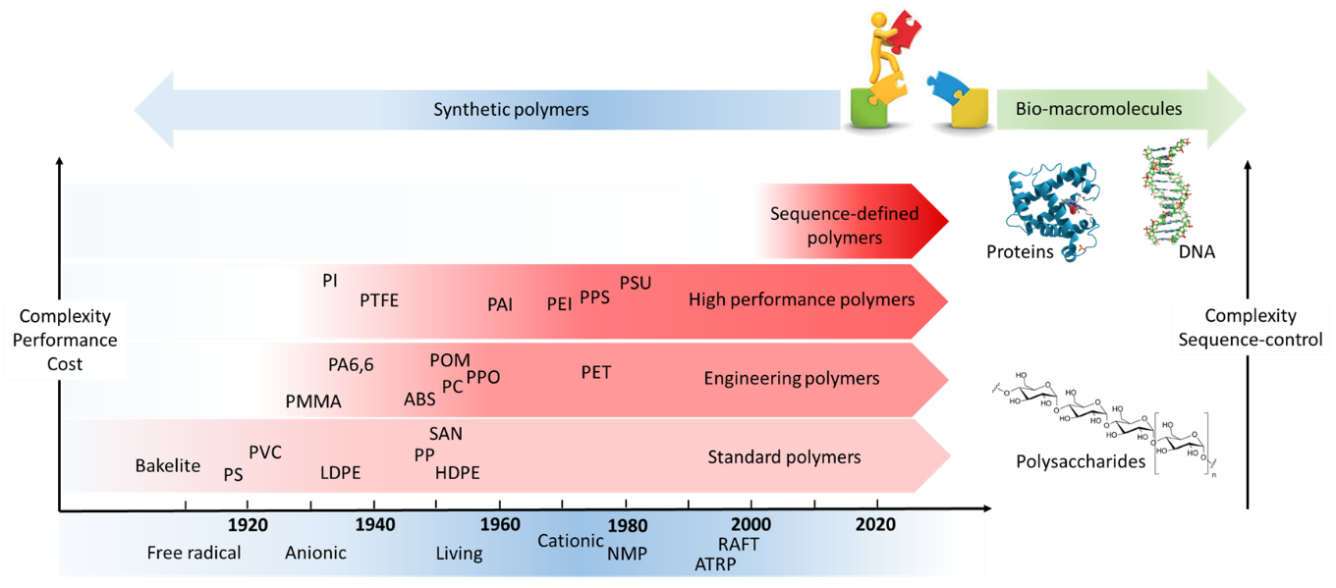Marie Skłodowska-Curie Action ITN EUROSEQUENCES
H2020 MSCA ITN
This Innovative Training Network (ITN), “EUROSEQUENCES” (2015-2018) encompasses a network of 9 notable academic promoters and 1 industrial partner – PSA Peugeot Citroën across 5 European countries (France, Germany, Belgium, the Netherlands and the United Kingdom) and 15 Early Stage Researchers. The programme aims to bring together varying, multi-disciplinary approaches in the synthesis of sequence-controlled and sequence-defined polymers from their fundamental synthesis through to targeted applications of this emerging field of polymer science. The project is coordinated by Dr Jean-François Lutz, CRNS, Strasbourg.
Since the first synthetic polymers were developed here at Ghent University in 1907 by Leo Baekeland, the field of polymer chemistry has grown immensely. Recent decades have yielded unprecedented results in terms of physical, chemical and mechanical properties leading to countless wide-reaching applications of man-made polymers. However, in many key aspects, Nature is still way ahead of us and successfully learning from and mimicking Nature for the advancement of chemistry is many scientists greatest ambition. Nature can perfectly control the order of monomers within such biopolymers as DNA, yielding multifunctional, monodisperse materials.
As a result, the Early Stage Researches involved within this programme will tackle the problem of synthesising polymers with both control and precise definition over the monomeric order of synthetic polymers. From this, they will study these materials to analyse how control of the sequence order can affect the chemical properties and whether it can target new, specific applications, as will be investigated by the industrial partner, PSA Peugeot Citroën.
All PhD students will work on collaborative projects with other institutions within the network, resulting in numerous pan-European collaborations, bringing together varying expertise (and available equipment at each of the institutions) to enhance academic output. Early Stage Researches are all enrolled as PhD students at their host universities, and successful defence of their thesis will result in the awarding of a PhD degree.
Objectives
These are the objectives of EUROSEQUENCES:
- Objective 1: Polymer Chemistry – Development of new synthetic routes from the preparation of sequence-controlled copolymers.
- Objective 2: Sequencing and Characterisation – To improve methods to study and read-out sequenced structures.
- Objective 3: Self-assembly and Folding – To study how the primary structure of sequence-defined structures has a direct influence on folding and supramolecular self-assembly.
- Objective 4: Materials and Properties – To study the correlation between primary structure and material properties.
Role of Ghent University
Professor Filip Du Prez of Ghent University acts as promotor of 1 PhD student within this European Network and the Polymer Chemistry Research Laboratory of the Department of Organic and Macromolecular Chemistry is the host group to a number of visiting PhD students from abroad in this collaborative, European network.
Contact
Prof. Dr. Filip Du Prez
Department of Organic and Macromolecular Chemistry
Phone number: +32 9 264 45 03
E-mail: Filip.DuPrez@UGent.be
